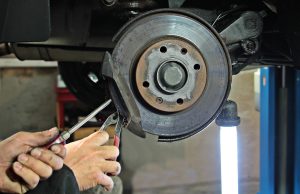
Poorly maintained brakes pose a safety risk to you and your passengers. In addition to periodical brake inspections, it’s important to be able to identify signs of brake trouble early on. Look out for the following five problems, all of which should prompt you to visit your nearest Chevy dealer for brake repair as soon as you can.
Spongy Brakes
If your brake pedal ever feels spongy and you’re decelerating too slowly, pull over right away. Spongy brakes might be caused by overheating rotors or leaking brake fluid. Either way, it’s dangerous to drive with underperforming brakes.
Squealing or Grinding Sounds
When brake pads wear down, they eventually begin emitting noises of distress when you use them. At first, you’ll hear a squealing sound, and later on, you’ll hear the grinding of metal on metal. It’s important to have the diminished brake pad changed out before your rotors become damaged.
Aging Brake Fluid
The brake fluid in Chevrolet vehicles should be refreshed every 45,000 miles or so. But this can vary from model to model, so be sure to check your owner manual. If your brake fluid is allowed to get too old, it will decline in volume, and your brake hoses will lose hydraulic function. This makes it harder to stop your car.
Brake Fluid Leak
A far more urgent danger is leaking brake fluid, which will cause a more sudden loss of braking power. A leak might even cause total brake failure. If you ever suspect a leak, don’t drive your vehicle. You’ll need to have it towed to your nearest Chevy technician.
Clicking Calipers
The calipers that house your braking mechanisms on each wheel can sometimes have little parts come loose. If a bolt, clip, or screw loosens, you’ll hear it clattering and clicking around when you brake. You’ll most likely need a professional to dismantle the caliper and refasten all the parts.
Have Brake Inspections at Your Local Chevy Dealer
It’s recommended to have your brakes fully serviced and inspected at least once a year. But if you usually drive in particularly brake-heavy conditions, consider having your brakes inspected every six months or even every three months.
Brake-Heavy Driving Conditions
Mountainous areas with plenty of steep downhill stretches require more braking than usual. Winding roads with many curves and corners also put more pressure on your brakes. Heavy urban stop-and-go traffic can wear them down faster as well.
If you increase the weight of your car by carrying heavy loads or towing a trailer, your brakes are going to be more strained. Finally, some drivers simply have a brake-heavy style that rapidly wears down their brakes. If you want your brakes to last longer, try to ease off on the pedal and allow gravity to slow your car where possible.
Visit Mark Wahlberg Chevrolet of Worthington today to have your brakes examined and repaired. We’re the region’s go-to dealership for all things Chevy.







